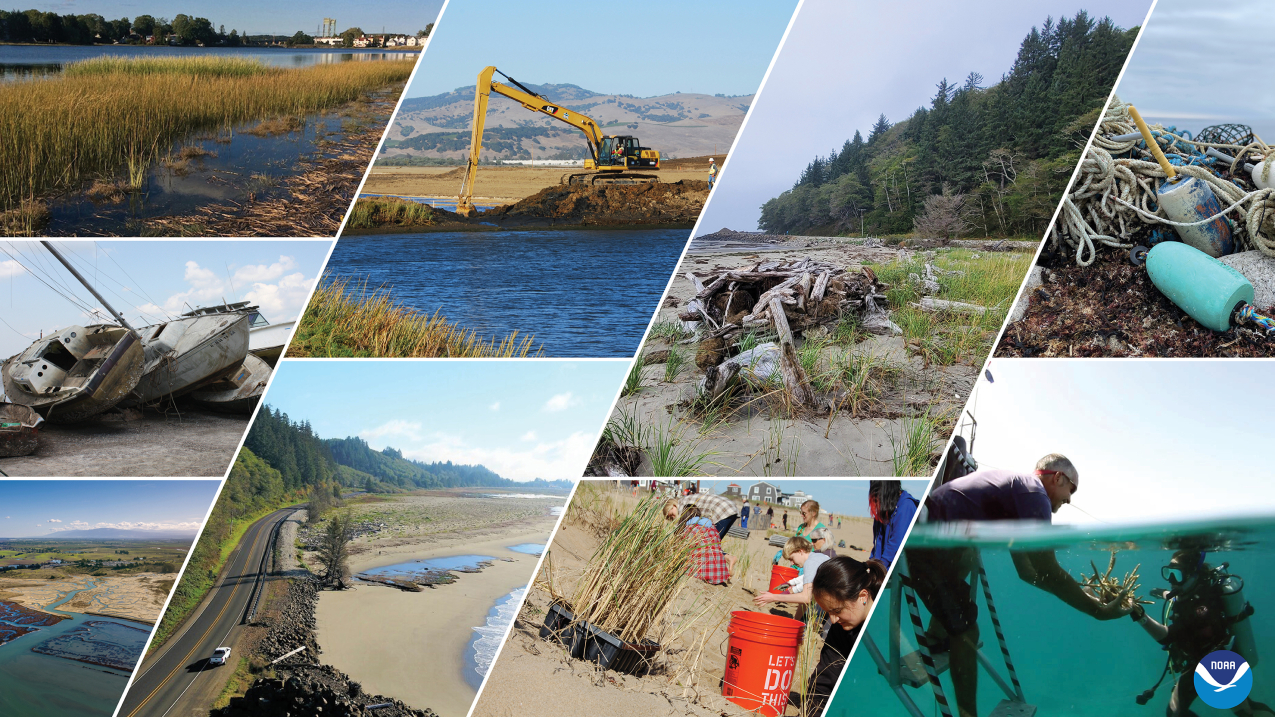Funding will strengthen NOAA’s Climate-Ready Coasts initiative

A photo collage of some of the projects being recommended for funding under the Bipartisan Infrastructure Law/Inflation Reduction Act and NOAA's Climate-Ready Coasts initiative. (Image credit: NOAA)
RESOURCES
-
NOAA Office of Coastal Management Climate Resilience Regional Challenge project site
- NOAA's Inflation Reduction Act web portal of projects and funding opportunities
RESOURCES
-
NOAA Office of Coastal Management Climate Resilience Regional Challenge project site
- NOAA's Inflation Reduction Act web portal of projects and funding opportunities
Today, Secretary of Commerce Gina Raimondo announced that the Department of Commerce and NOAA have recommended $68.5 million for a project in Hawaiʻi to make the state’s coast more resilient to climate change and other coastal hazards. The awards are being made under the Biden Administration’s Climate Resilience Regional Challenge, a competitive, $575 million program funded through the nearly $6 billion total investment under the Biden-Harris Administration’s Inflation Reduction Act.
“As part of President Biden’s commitment to combating the climate crisis, we are investing $575 million to help make sure America’s coastal communities are more resilient to the effects of climate change,” said U.S. Secretary of Commerce Gina Raimondo. “As part of this historic investment in our nation’s climate resilience the Biden-Harris Administration is investing $68.5 million to help underserved communities in Hawai’i develop and implement new strategies to protect themselves from flooding, wildfires, and extreme weather events.”
Administered by the Department of Commerce and NOAA, the Climate-Ready Coasts initiative is focused on investing in high-impact projects that create climate solutions by storing carbon; building resilience to coastal hazards such as extreme weather events, pollution and marine debris; restoring coastal habitats that help wildlife and humans thrive; building the capacity of underserved communities and support community-driven restoration; and providing employment opportunities.
“Reducing risks and advancing climate resilience often means focusing on community-based governance and stewardship,” said NOAA Administrator Rick Spinrad, Ph.D. “This funding will help build a more resilient future for the Hawaiian Islands through planning, protection, and restoration actions grounded in Native Hawaiian traditions and knowledge.”
The recommended project in Hawaiʻi includes $68.5 million for work with the University of Hawaiʻi Sea Grant College Program. The project, Āina Restoration through Community Governance to Advance Climate Resilience in the Hawaiian Islands, will result in a reinvigorated moku system (a Native Hawaiian framework for traditional land tenure and contemporary biocultural stewardship) to build a resilient future for the Hawaiian Islands against increased heat, drought, flooding, sea level rise and wildfires.
Actions include: Conserving and restoring forests and watersheds; enhancing regional community-based coastal stewardship; restoring marine abundance; sharing knowledge and strengthening networks across communities; reducing risk and improving disaster resilience; and advancing community governance and co-stewardship models.
Project activities center on five moku, one on each of the islands of Kauaʻi, Oʻahu, Molokaʻi, Maui and Hawaiʻi. Building on the foundational activities found in these five moku, the project will support regional knowledge sharing, Native Hawaiian stewardship and cultural practices, collective action, transferable strategies for resource stewardship and climate change adaptation.
“This new federal funding – part of the Inflation Reduction Act’s historic investment in climate action – will restore critical watersheds and forests and utilize Native Hawaiian knowledge and practices to help move us to more a sustainable, climate resilient future for Hawai‘i,” said U.S. Senator Brian Schatz (D-Hawai‘i).
“Thanks to the Inflation Reduction Act, a historic $68 million will be invested in Hawai‘i for community-driven climate resilience initiatives. As a coastal state with a rich history of ‘āina stewardship, Hawai‘i will greatly benefit from the University of Hawai‘i’s work to protect our island home from the impacts of climate change by restoring watersheds and native forests, reinvigorating coral reefs, and revitalizing food systems,” said Congresswoman Jill Tokuda (D-HI). “I firmly believe that climate resilience strategies and solutions must be rooted in the traditions and practices of the people and communities we are working to protect. This project marks an important step in our shared efforts to safeguard the environment, the cultural heritage, and the people of Hawai‘i.”
“In Hawaii our community, culture, and economy all thrive because we have healthy and resilient coastlines,” said Hawaii Governor Josh Green. “The Āina Restoration through Community Governance to Advance Climate Resilience in the Hawaiian Islands project will reinvigorate historical systems of resource management to build a resilient future for the Hawaiian Islands against increased heat, drought, flooding, sea level rise and wildfires. This is an exciting opportunity and we look forward to the partnerships that will emerge thanks to the University of Hawaii and the support of the Biden-Harris administration and the incredible folks at NOAA.”
Additional information is available on the Climate Resilience Regional Challenge website.
Climate, weather, and water affect all life on our ocean planet. NOAA’s mission is to understand and predict our changing environment, from the deep sea to outer space, and to manage and conserve America’s coastal and marine resources.
Media contact
Kimberly Rodgers, kim.rodgers@noaa.gov, (771) 233-3988
Related Features //
RESOURCES
-
NOAA Office of Coastal Management Climate Resilience Regional Challenge project site
- NOAA's Inflation Reduction Act web portal of projects and funding opportunities




